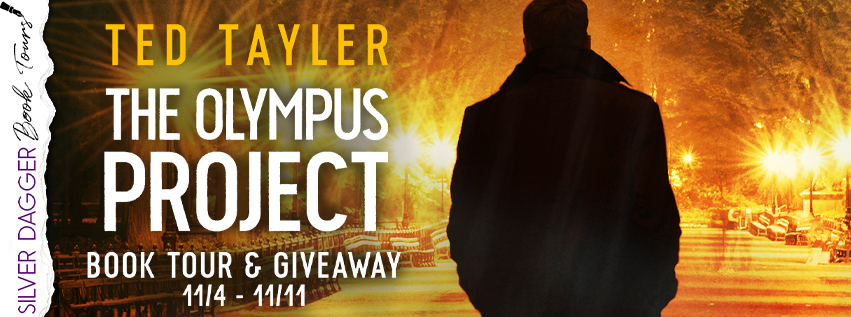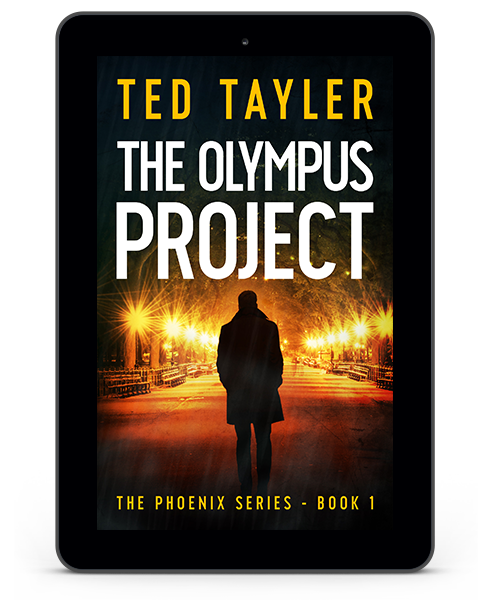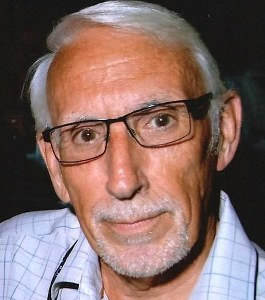A secret organisation delivers swift justice where the system fails ➱ The Olympus Project Crime Fiction by Ted Tayler Free Book Blitz with Guest Post & Giveaway
A secret organisation delivers swift justice where the system fails.
Pages filled with tension and suspense.
The Olympus Project
The Phoenix Series Book 1
by Ted Tayler
Genre: Thriller, Suspense, Crime Fiction
A man plucked from a watery grave and given a new identity, meet The Phoenix – a ruthless assassin sculpted by circumstance. Embraced by the Olympus Project, a clandestine bastion against injustice, The Phoenix becomes the embodiment of swift, unyielding retribution. Buckle up for a rollercoaster of unrelenting action, immersing you in a world of high-stakes intrigue. With characters so vivid, you’ll feel their breath on your skin, the Olympus Project is the spellbinding thriller series for which you’ve been searching.
THE
PHOENIX
Colin Bailey is The Phoenix. In the book that
preceded this series, a tragic event turned Colin’s life upside
down and unleashed a killing spree in his quiet West Country town. He
narrowly cheated death under Pulteney Weir in the Roman City of Bath,
and is now working with a secret organisation engaged in fighting
injustice. The Phoenix has a clearly defined set of values regarding
what is right and what is wrong. He believes guilty criminals must
pay the price.
(Read CONCEPTION – THE BIRTH OF THE
PHOENIX – for Colin Bailey’s story)
SETTING
Larcombe
Manor is the headquarters of The Olympus Project and lies several
miles northwest of Bath. The true nature of the organisation is
hidden from the outside world. The Charity Commission believes the
Manor is home to service personnel suffering from PTSD who are
treated at the Manor until they’re ready to return to duty or
civilian life. Larcombe is the family home of Commodore William
Horatio Hunt OBE, and he is the senior Olympus agent on site: code
name Erebus.
PRAISE FOR TED TAYLER:
"Tayler's
intrigue is timely given world events. I can easily see the premise
being real.”
“Vigilantes motivated by hope for
a better world. Justice delivered where the system
fails."
“Characters using their personal
tragedies as motivation to fix the world."
"Spinning
a tale of fear and violence straight from world headlines."
SERIES
LIST
The Olympus Project
Gold, Silver,
and Bombs
Nothing Is Ever Forever
In The Lap
of The Gods
The Price of Treachery
A New
Dawn
Something Wicked Draws Near
Evil Always
Finds A Way
Revenge Comes in Many Colours
Three
Weeks in September
A Frequent Peal Of Bells
Larcombe
Manor
**Get it FREE Nov 4th ONLY!!**
Extract from ‘The Olympus Project.’
The late evening sunshine bathed everything
on the far bank of the river. The man in the water was barely breathing. He
hooked his right arm over a lower branch of one of many overgrown bushes and
trees scattered along the waterline.
A thinning group of people peered across
the water, shading their eyes. The glare of the sunlight blinded them as it
disappeared behind the rooftops of the nearby buildings. The group continued to
gaze across to the opposite bank. They searched and searched for a glimpse of their
quarry but saw nothing. He was too tired to move. The bushes and tethered
barges strung along that stretch of water below the Pulteney Weir provided the
perfect shelter.
The man rested. Safe, for now, his mind
drifted back to the last few hours' events.
His plans had gone out of the window when that stupid female copper recognised him
and shouted. A bullet shut her up, but an old bag, no doubt her mother, chased
after him and lashed out with her handbag. He remembered descending the steps
to the towpath in a blind panic, trying to calm his nerves and gather his
thoughts.
He thought he could make it back to the
Land Rover. Get the hell out of this city. Then he spotted a uniformed
policeman running towards him. He had no choice but to turn and sprint back
towards the steps. The man remembered running alongside the Weir. He was only a
few strides from the spiral steps leading to the street. At least there, he
might see a chance of escaping among the city crowds.
He had heard a shout feet away. As he
glanced over his shoulder, he spotted his nemesis. That meddling policeman had
pursued him the length and breadth of the country. With a warning shout, the
policeman was on his heels and launched himself towards him. They both fell
headlong over the railings and into the river's murky waters. Both men
surfaced, gasping for the air knocked from them by the force of the impact.
At first, the man struck out for the
opposite bank, with confidence, despite his lack of experience. The policeman
followed. The man soon realised his adversary was a much stronger swimmer and
any thoughts of a quick escape were futile. The two men grappled, and while
both concentrated on gaining the upper hand, they drew closer and closer to the
Weir and its lethal foaming waters. The nature of the water altered around them
as they fought, and both men realised the danger they faced. Finally, they
disappeared under the surface and got tossed around under the Weir like socks
in a washing machine.
The water clutched at the man’s legs,
dragging him further under the water. He cracked his knees and elbows on the
concrete buttresses of the Weir. He punched and kicked at the policeman as they
both tried to swim back towards the surface. When they did, the respite was
brief. A second to take in an invaluable lungful of air, and then the water
snatched them back under the churning waters. They resumed their battle at
once, but their struggle took its toll. Their actions grew more and more
laboured. Both men soon reached the end of their tethers. Neither man knew
which way was up any longer. Battered and winded, each swallowed large
quantities of water. The man sensed the policeman release his hold and watched
as he drifted away.
The man didn’t know if his nemesis had sunk
to the riverbed or surfaced and reached safety. The man felt happy he no longer
needed to fight and was prepared to resign himself to his fate. He sensed his
lungs giving up the ghost as an excruciating pain built within his chest. The
man broke through the surface and took a desperate breath. The pain increased.
Successive breaths brought little relief, but he willed himself to press
forward, away from the direction the policeman had gone.
As he surfaced again for a moment, he realised
that he was near the far bank. He drifted in silence behind a barge. The man
forced himself, against his instincts, to swim under the near side of the
barge’s hull, keeping the river wall at his fingertips. When he surfaced once
more, he continued to breathe. Each breath was becoming more manageable, but it
exhausted him.
With a supreme effort, he got his right arm
over a branch and rested; he needed to stay focused because if he slipped under
the water again, he understood there was no chance of saving himself.
From his place of sanctuary, he saw people
running on the towpath. He heard sirens blaring somewhere nearby. He tried to
check his condition. He had suffered cuts to his legs and shoulder, but he
didn’t appear to have any broken bones. He felt bitterly cold. He was suffering
from shock. There was no time to worry. A helicopter throbbed overhead. As
night fell, a searchlight would soon probe the little nooks and crannies trying
to find him. If only he could evade capture long enough for them to believe he
drowned in the Weir. To assume his body had floated downstream. Maybe he could
yet escape this mess.
An hour later, the towpath had emptied. The
armed response men had withdrawn; the paramedics and onlookers had disappeared.
He looked across to the opposite bank where a distinguished-looking, elderly
gentleman stood in the shadows of a bridge talking on his mobile phone. The man
looked right at him as if this man knew where he was hiding. Had the man near
the bridge called the police? Was this how it ended?
The elderly gentleman smiled to himself.
Then he spoke aloud as if talking to someone in a crowded room. Someone who
struggled to hear what he said: -
“Hold on for a few minutes more, Mr Bailey.
There’s a good chap. Our people will be along in a tick to remove you. You’ll be
safe then and among friends.”
What
is one of your pet peeves?
The lack
of ‘live’ music venues for young musicians. When we started out in the early
60s, there were youth clubs, village halls, pubs, working men’s clubs, sports
and social clubs, and larger dance halls that were prepared to give us a
chance. So many of those venues have closed, and many that remain settle for
‘covers’ bands or discos, rather than promote a new band writing their own
material.
What
are you passionate about these days?
Protecting
free speech. When I became a teenager, one of the first things my parents
taught me was to respect the opinion of others; and not just my elders. Whether
I believed people were misguided, or just plain wrong, everyone was entitled to
their own view on a subject – politics, religion, whether the world was flat,
anything and everything, there were two sides to every argument. Times have
changed, and not always for the better.
Describe
yourself in 5 words or less!
Aspiring
national treasure.
When
did you first consider yourself a writer?
When a
retired Naval Commander wrote to me a couple of years ago, asking who I’d
spoken to at Faslane – home to Britain’s nuclear submarines. I’d written about
the base in ‘Buried Secrets’ from the Freeman Files, and he was impressed with
the accuracy of my observations on how the Royal Navy and the Russians
operated. I was forced to admit that Google had provided the framework; the
rest was my fertile imagination.
What
can we expect from you in the future?
That’s a
tricky one. I’m almost eighty, so long-term planning is optimistic. Also, after
writing fifty-six books in ten years, I’m undecided whether to commit to
another series. Perhaps, if I have a great idea for a book, I could write a
standalone title featuring a character I’ve already created?
An
adventure for Rusty Scott from The Phoenix Series where he infiltrates an
organized crime gang to bring them to justice; or follow DI Grace Packenham’s
first murder investigation with the Metropolitan Police after Gus Freeman’s
cold case review team was disbanded.
If
The Phoenix became a film franchise, who would you like to play the lead?
I’d remind
the casting director that Colin Bailey was nondescript. The sort of character
people walked past in the street and didn’t register. Average in height,
weight, looks, and attire. It should be the ideal opportunity for an actor
who’s been overlooked for leading roles in the past but can both act and handle
action sequences with aplomb. I rarely watch films these days; so, I don’t have
a clue whether there’s an English actor who fits the bill.
If
The Freeman Files became a filmed series, who would you like to play the lead?
I’m not
sure the stories lend themselves to the silver screen. They’re more ‘Midsomer
Murders,’ or for older viewers, Ruth Rendell’s ‘Inspector Wexford’ from British
TV.
Gus
Freeman reasons his way through murder investigations rather than engaging in
car chases and non-stop action. With a few tweaks, it could work on TV, and my
preference would, again, be for new faces, rather than familiar ones. Although,
I wouldn’t say no if Hugh Laurie was interested in playing Gus.
Are
your characters based on real people or did they all come from your
imagination?
When you
get to my age, you have a lot of different people on which to base your
fictional characters. If you get things right as a writer, you produce
characters with a range of quirks and idiosyncrasies the reader finds
believable. Strong characters that fit seamlessly into the situations in which
you put them. I’ve enjoyed creating dozens of new characters, but they’re
always imaginary, never based on one specific person I’ve met.
Who
are your top 10 favourite authors?
William
Shakespeare,
Charles
Dickens,
Sir Arthur
Conan Doyle,
Agatha
Christie,
Josephine
Tey.
Ruth
Rendell,
Colin
Dexter,
Ian
Rankin,
Lee Child,
Karin
Slaughter.
What
do you think about the current publishing market?
I’m glad I
started writing when I did, despite being sixty-seven years old, because
self-publishing was available to me. The journey was harder because I had to
learn on the job, plus handle my own marketing, but I would never have
published as many books as I have if I’d followed the traditional route.
When indie
writers were first around, the traditional crowd looked down on them, and
thought they’d go away in time. Over the last three years, I’ve seen more and
more books appearing on Amazon (often with new covers and titles) from authors
whose books were big sellers in hardback and paperback, ten, twenty, even
thirty years ago. Some language in those books has been moderated to reflect
changing times, but the publishers have at long last realized how much money
can be made from the Kindle and Audio market. That’s made life tougher for an
indie author like me, but there’s no point moaning about it. The market is
expanding, so there’s room for both types of writers to be successful – if
you’re prepared to work hard for it.
Do
you read yourself and if so, what is your favorite genre?
I used to
read between 150 and 200 books a year and posted reviews on Amazon and
Goodreads. My choice was usually from the Mystery, Thriller and Suspense
category, but sometimes I received requests from other authors that allowed me
to dip into different genres. I haven’t found as much free time since my own
books became more popular. I’m reading 75-100 books a year these days.
What
have you read recently?
Eight from
September: -
Whispered
Bones – NC Lewis
Little
Girl Missing – JG Roberts
If I Run –
Molly Black
Watch Her
Vanish – Ellery Kane
No Mercy –
Blake Pierce
Fool Me
Once – Solomon Carter
Father
Brown Collection – G K Chesterton
The Murder
Book – Mark Billingham
What does success
in writing look like to you?
A
girl who was at school with my twin daughters read my first book. and wrote to
me; she said it was the best book she had ever read. She had left school
seventeen years before and read nothing since. Now that’s what I call a
success!
If
something I wrote can give someone back the love of reading that they had lost,
then would a ‘best seller’ selling thousands of books to people who read all
the time be any more satisfying?
Do you read your book reviews? How do you deal with
bad or good ones?
In
2017 I contacted a prolific author whose books I’d read and enjoyed, to ask how
they were so successful while attracting such a high percentage of unfavourable
comments. They said that unlike Ian Rankin and Lee Child, who could spend
eighteen months polishing their manuscript so that it shone like a diamond,
they needed to publish half a dozen titles each year in order to put food on
the table for their family. So, they accepted that readers would spot the
typos, and the change of character name halfway through a book. Their job was
to continue to do their best to turn out fast-paced, page-turning stories that
most readers enjoyed.
I’m
a storyteller who tries to follow the same path. I won’t find all the elusive
typos, and I know that my grammar isn’t perfect. I don’t ignore the bad
reviews, nor do I go over the top with the stellar variety. I too can’t expect
to have a manuscript that shines like a diamond when I aim to publish six
titles a year. What I need to do is ensure they’re fast-paced, page-turners and
pray readers enjoy them.
Which is your favourite character and why?
That’s
a difficult question. Colin Bailey (The Phoenix) the vigilante assassin, was
someone I wrote about for six years. He believed the punishment should fit the
crime. I enjoyed writing about him, but.
I’ve
decided Rusty Scott is my favourite. I don’t think that will change, however
many series I might write. Rusty was the Phoenix’s best friend and right-hand
man throughout the series. Mr Dependable.
Ted Tayler is the international best-selling indie author of the Freeman Files and Phoenix series. His next project is another series of challenging mysteries set in England in the 1930s. Brothers In Crime is scheduled to appear on Amazon from October 2023.
Sign up to his mailing list at tedtayler.co.uk to keep informed about future release dates, giveaways, and exclusives. In addition, readers can find him on BookBub, Twitter, Instagram, and Facebook.
Ted Tayler lives in the English West country, where his stories are based. Born in 1945, Ted’s been married to Lynne since 1971. They have three children and four grandchildren.
Since he published his first novel in 2013, Ted has sold over 50,000 books and surpassed 20 million page reads on Kindle Unlimited. His thought-provoking mysteries appeal to readers of Sally Rigby, Joy Ellis, Pauline Rowson, and Faith Martin. His action-packed thrillers are a must for fans of Mark Dawson, Jack Mars, and J C Ryan.
Gus Freeman’s cold case investigations are carried out with reasoned deduction rather than bursts of frantic action. In each of the 24 books, unsolved murder is accompanied by romance, humour, and country life. The core message in the 12 Phoenix novels is that criminals should pay for their crimes. Unfortunately, the current system fails to deliver the correct punishment, so Phoenix helps redress the balance.











This sounds like the perfect weekend read
ReplyDelete